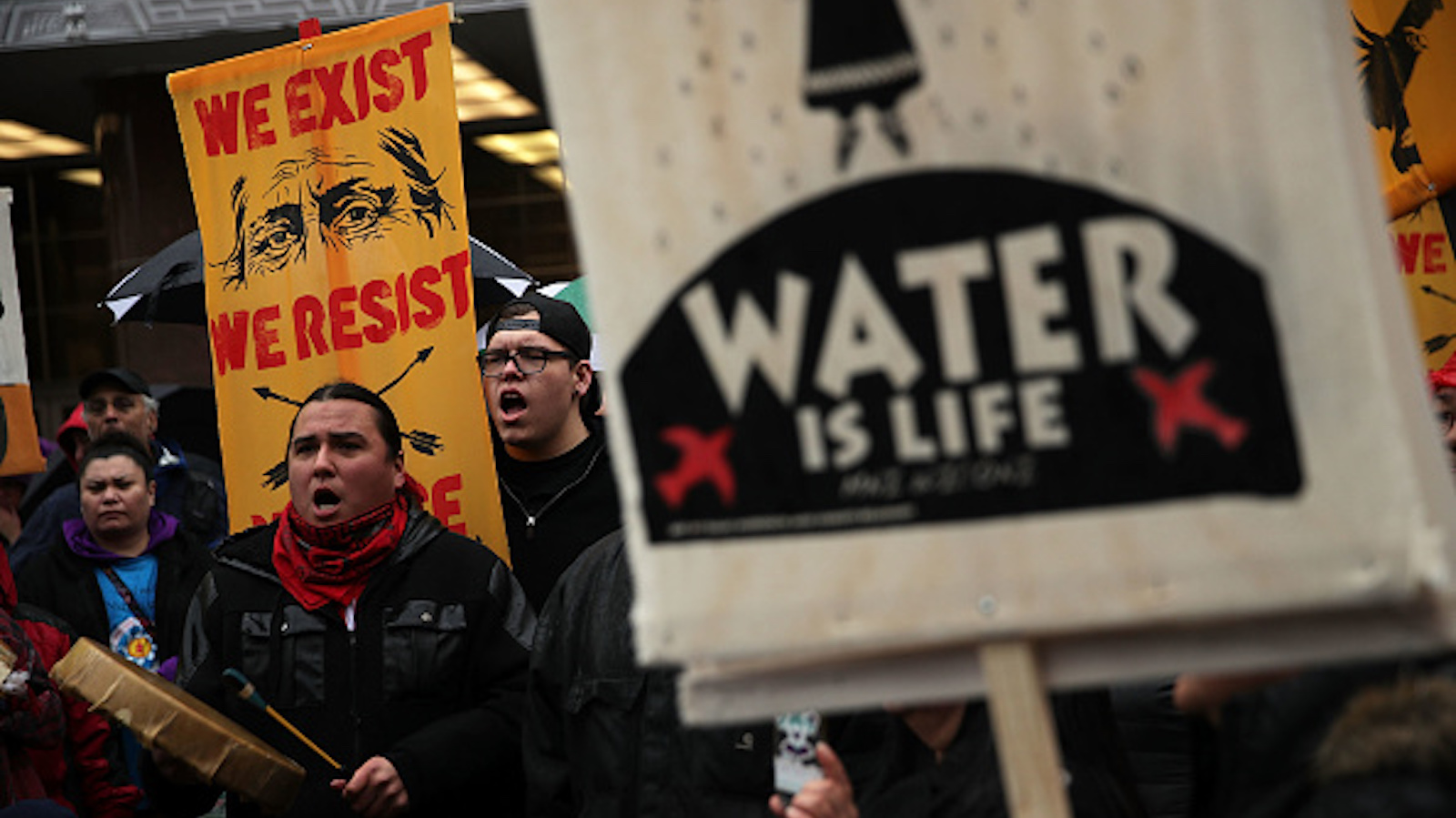This story was originally published by The Guardian and is reproduced here as part of the Climate Desk collaboration.
Indigenous leaders and environmentalists are urging Joe Biden to shut down some of America’s most controversial fossil fuel pipelines, after welcoming his executive order canceling the Keystone XL (KXL) project.
Activists praised the president’s decision to stop construction of the transnational KXL oil pipeline on his first day in the White House, but they stressed that he must cancel similar polluting fossil fuel projects, including the Dakota Access pipeline (DAPL), to stand any chance of meeting his bold climate action goals.
The KXL order was issued on Wednesday as part of the first wave of Biden’s promised environmental justice and climate action policies, which include rejoining the Paris Agreement and halting construction of the southern border wall.
Rescinding the Canadian-owned KXL pipeline permit, issued by Donald Trump, fulfills a campaign promise Biden made in May 2020 and comes after more than a decade of organizing and resistance by Indigenous activists, landowners, and environmental groups.
“The victory ending the KXL pipeline is an act of courage and restorative justice by the Biden administration. It gives tribes and Mother Earth a serious message of hope for future generations as we face the threat of climate change. It aligns Indigenous environmental knowledge with presidential priorities that benefit everyone,” said Faith Spotted Eagle, founder of Brave Heart Society and a member of the Ihanktonwan Dakota nation.
“This is a vindication of 10 years defending our waters and treaty rights from this tar sands carbon bomb. I applaud President Biden for recognizing how dangerous KXL is for our communities and climate and I look forward to similar executive action to stop DAPL and Line 3 based on those very same dangers,” said Dallas Goldtooth, a member of the Mdewakanton Dakota and Dine nations and the Keep It In The Ground campaign organizer for the Indigenous Environmental Network.
Donald Trump sanctioned the KXL and DAPL pipelines soon after taking office — which paved the way for scores of executive actions and rollbacks favoring fossil fuel allies while violating Indigenous rights and environmental standards.
The KXL pipeline was set to go through the heart of the Oceti Sakowin territory. It was the final section of a vast pipeline network transporting tar sands oil from Alberta, Canada, to ports on the U.S. Gulf Coast. Most of the network was built during the Obama administration and is already operational.
The 2020 elections saw a historic turnout of Native Americans, who helped deliver victory for Biden in key states including Arizona and Wisconsin.
The new president has so far been praised for assembling a top team of climate and environmental justice experts to lead his government’s efforts and undo some of the damage inflicted over the past four years — and during previous administrations.
But pressure is already mounting on Biden to take action on similar pipelines that campaigners say were sanctioned without conducting legally required consultations with Native communities, and which threaten to pollute land and water and contribute to greenhouse gas emissions that cause global heating.
Last week, 75 Indigenous female leaders from across the country sent a letter to the incoming administration calling on it to immediately halt fossil fuel projects which threaten their land, water, health, culture, and security. They wrote: “No more broken promises, no more broken Treaties … We urge you to fulfill the United States promise of sovereign relations with Tribes, and your commitment to robust climate action.”
On Tuesday, tribal leaders wrote to Biden urging him to shut down the DAPL. The Standing Rock Sioux tribe and the legal non-profit Earthjustice released a video message to Biden voiced in the Lakota language called Tȟokáta Hé Miyé /My Name Is Future.
Biden has not spoken publicly about DAPL, but last May, Kamala Harris signed an amicus brief and joined tribes in calling on a judge to shut it down while an environmental impact study is conducted.
Shutting down DAPL, which crosses through communities, farms, tribal land, sensitive natural areas, and wildlife habitat across North Dakota to Illinois, would be more complicated than canceling KXL as it is already being built and is transporting about 500,000 barrels of crude oil each day.
“It is a more complex legal scenario, but they could do it tomorrow as it’s operating without a permit and has been declared illegal by federal courts,” said Jan Hasselman, a lawyer at Earthjustice, which represents the Standing Rock Sioux Tribe in ongoing legal action. “It’s crazy to continue investing in new fossil fuel infrastructure when we need to be abandoning it.”
The proposed expansion of another huge Canadian-owned tar sands oil pipeline crossing Indigenous lands, Line 3, is also under the microscope. In Minnesota, police have arrested scores of peaceful protesters trying to stop construction.
At the heart of Biden’s climate plan is ensuring the U.S. achieves a 100 percent clean energy economy and reaches net-zero emissions no later than 2050 — which experts say is not possible if investment in oil and gas continues.
“[Today’s] great win comes after a decade of organizing — and since the scientific and human rights principles are exactly the same for DAPL and Line 3, we assume we’ll hear similar good news on them soon,” said Bill McKibben, co-founder of the environmental group 350.org.
Nick Estes, a member of the Lower Brule Sioux nation and assistant professor of American Studies at the University of New Mexico, said: “Biden has the right people in his team, but we don’t know yet if he’s going to break from Obama’s policy of domestic energy production. If he’s genuine about climate action, it makes no sense not to cancel the Dakota Access and Line 3 pipelines, even if it’s harder to do. We need to see bold maneuvers.”



